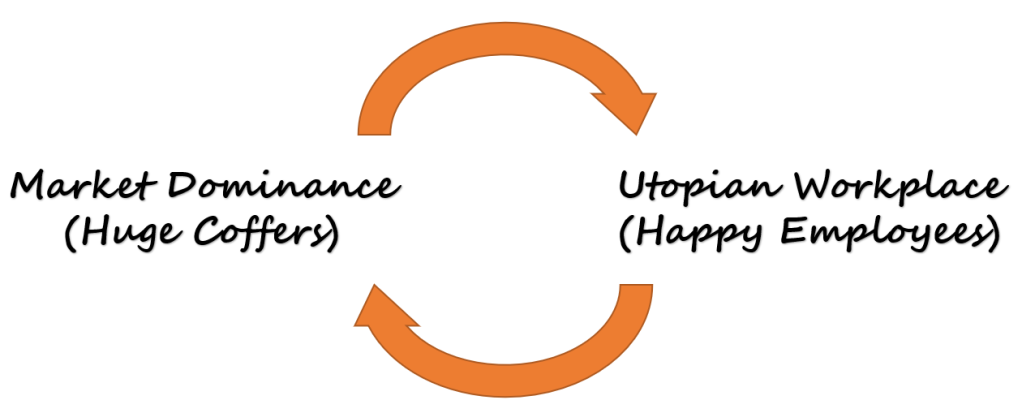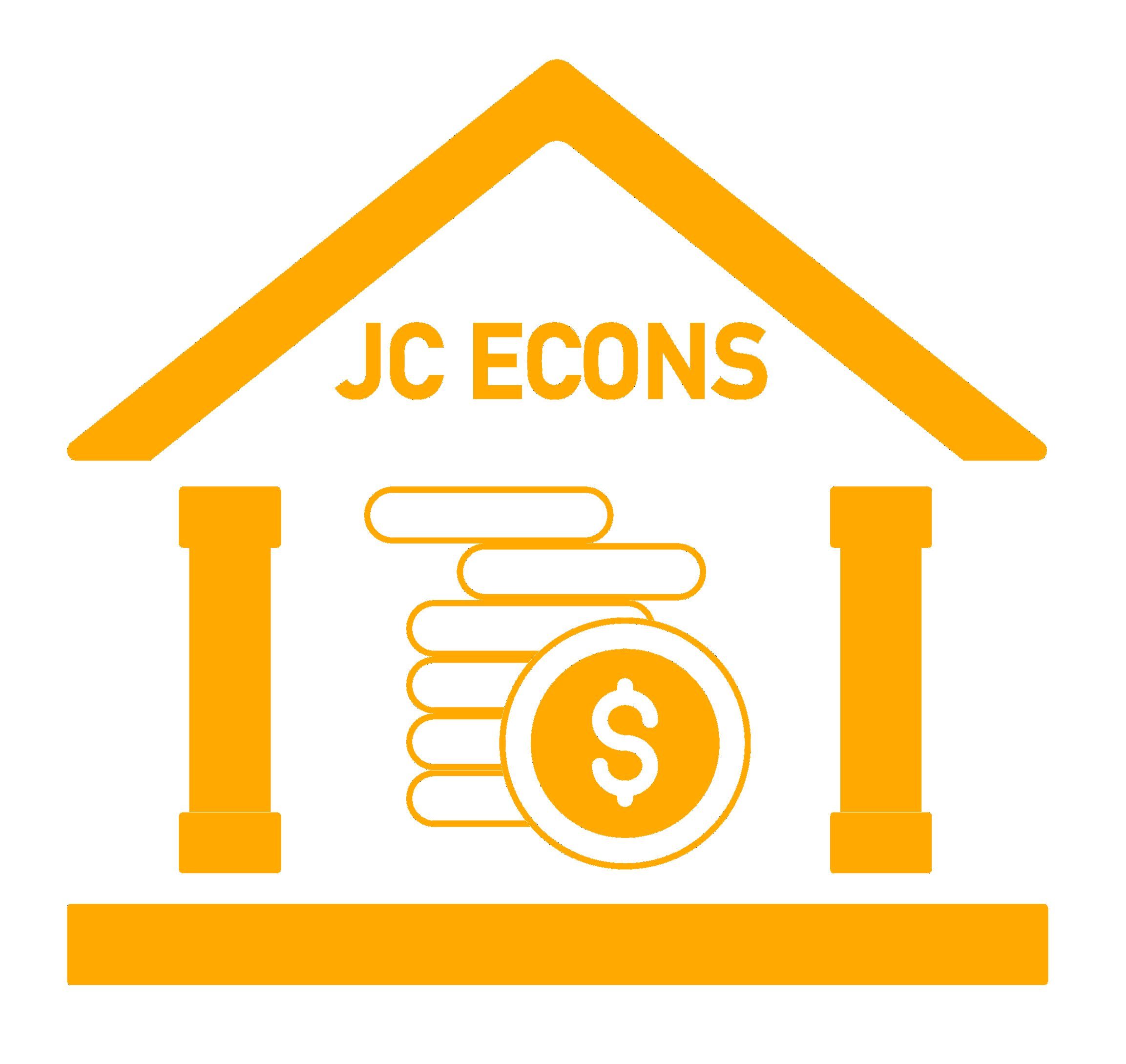In the standard Economics 101 narrative, most firms are generally assumed to be profit-driven. Of course most students are aware that this is a blissfully watered-down simplification of real-world matters.
Aside from the fairly obvious reason that firms are likely to have a more pluralistic representation of goals (e.g. social responsibilities, political cultivations to name a few), it is important for us to recall that firms are essentially collectives of people. This means that firms’ goals are unlikely to be immune to the bias of central figures within themselves, and also the cultures built within them.
Inspiration to this write-up came courtesy of my opportunity to work with a company whose dominance is so utter at the moment, that some of us might fail to imagine life without it.

Why do firms want to dominate? Is it to profit-maximise? Is it to maximise company value?
Probably and probably.
But when the firm has become dominant and nigh on impossible to dislodge, what drives it to ensure that it stays atop the pecking order?
To borrow the standard Economics 101 narrative: To carry on ripping consumers off (because they can and for some reason want to)? To become fat and lazy?
While I can’t speak for you, I am hardly convinced by these arguments. These are proverbial tips of icebergs that you will observe only, lest you peek beneath the waves.
The perfect workplace.
In this company that I work at now, breakfast and lunch are served daily. And in my humble opinion, they are really good stuff – there was even a meal last week that featured lamb and crayfish.
My workspace is utilitarian, yet very comfortable, with no (major) shortage of the necessities to keep you going through the day.
My work-hours are the complete opposite of the 996 system (look it up here if you haven’t heard about what it is – I sincerely hope you haven’t).
My colleagues are smart, friendly and helpful. I’ve had my share of less-than-ideal work partners so I know good ones when I see them.

As far as the description goes, this can pass off for a utopian workplace. Actually, I know what you are thinking: That this sounds more like a place to grow fat and lazy.
On the contrary though, my colleagues are both competent, and highly competitive (but no backstabbing or anything like this observed thus far).
Having said all of that, it might not be wrong for me to add that actively pursuing the “perfect workplace for employees” is important in maintaining a firm’s edge.
Allow me to take a step further, and assert that the reverse holds true as well: Market dominance enables the awesome workplace, which importantly, sets up a virtuous cycle of gains for the firm:

Coriander and handwash.
One of my favourite stories that illustrates the above point went like this:
My department holds a weekly catch-up session where ongoing and upcoming activities are shared, and which also acts as a forum for miscellaneous discussions, if any.
To facilitate the latter portion, a short phrase is solicited from each team member anonymously with the only explicit rule being “the first thought that comes to mind”. A word-cloud is then generated based on the inputs and shown at the meeting for all to see – something like this:

At one session, a particular word “Coriander” had an appearance count of no less than 7 times, sparking mild concern from our boss on the possibility of unhappy employees (triggered by food omg).
Our boss asked for an elaboration on the matter, but (un)surprisingly, none were forthcoming, despite the relatively high number of mentions in this instance.
Frankly, I found the matter trivial: My take was that if you didn’t like it, just set the garnish aside and carry your merry way on eating. And I wasn’t the only one thinking along these lines, based on slightly incredulous smiles some of us started sporting.
Unfortunately, that triggered a 5 minute lecture from our boss, who emphasised to us the importance of us playing our part in providing constructive feedback to improve our work environment, for ourselves!

Of course it wasn’t lost on us that it might be in the company’s interest to keep us happy. Still, I am inclined to believe the intentions are genuine. There are too many unhappy stories about southbound employer-employee relationships for me to be overly-cynical about my boss’ gesture.
In any case, the only comment my boss got relating to corianders, was on how the handwash in our washrooms were “strange-smelling”. I for one, failed to make the connection, but I suppose that’s alright?
Unable to gather further comments relating to coriander, and not keen on taking up precious time, the session ended with my boss promising action and updates by the next session. And in case you wonder, he really made good on his word. So, good on him!
Realising the perfect world.
Clearly, the company was taking employee welfare very seriously. Of course it can be straightforward in making a link between that and the aim of profit-maximising, from the firm’s perspective.
In particular, thanks to the hugely superior environment, the teams are able to concentrate on delivering their goods, to the point where I have actually observed The Flow at work.
This term was coined by Mihály Csíkszentmihályi in 1975 to describe teams that exhibit incredibly rich and superior collective focus on tasks at hand.
Being part of the privilege in enjoying the benefits of such a stupendously productive environment got me thinking that it would not be a stretch to imagine that the company’s leadership personally enjoy such an environment as well.

Taking it one step further, it might be plausible that the company’s leadership may well seek profits as a means to the sustenance of having a “perfect” workplace. If it hasn’t been clear yet, it should be stated that such employee privileges (coriander, handwash and all) do not come cheap and can only be paid for sustainably through profits.
And if you believe money as the means to ends, then you would not find it unbelievable that the true aim of firms, driven by their leadership (and employees, if aligned well) is to shape impactful outcomes to the likes of their definitions of their perfect worlds.
Think about it.
It should be mentioned that this assertion says a lot, yet potentially says nothing substantive.
Consider the possibility of how employers may narrowly and obsessively pursue money for the sake of it. It doesn’t make for much description of a perfect world, and yet it arguably is, to the extent of perception by such employers.
Be wary about how people may look and sound smart only on the surface! There are tricks to doing so convincingly and one such study, aptly called “On the Reception and Detection of Pseudo-Profound Bullshit” was pretty illuminating and depressing at the same time.

Still, I argue that the maxim of profit-maximisation as the go-to justification for firm behaviour is at best, too restrictive. To cite just one example, consider the extent of hold Mark Zuckerburg has on Facebook. It shouldn’t escape observers that creating the utopian workplace (playground) may well be one of his aims in mind.
After all, if you had money, resources, and opportunities, would you not try to create a perfect world for yourself too?

Spot on with this write-up, I seriously believe this site needs far more attention. I’ll probably
be back again to read more, thanks for the advice!
LikeLike